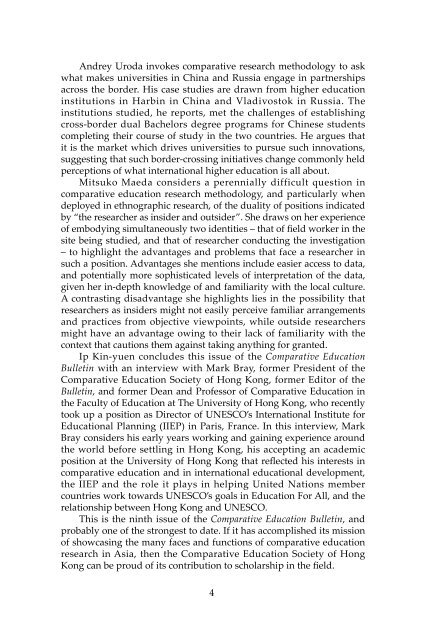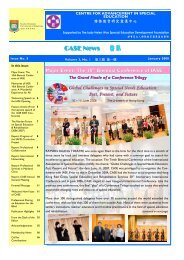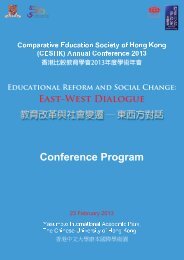Comparative Education Bulletin - Faculty of Education - The ...
Comparative Education Bulletin - Faculty of Education - The ...
Comparative Education Bulletin - Faculty of Education - The ...
Create successful ePaper yourself
Turn your PDF publications into a flip-book with our unique Google optimized e-Paper software.
Andrey Uroda invokes comparative research methodology to ask<br />
what makes universities in China and Russia engage in partnerships<br />
across the border. His case studies are drawn from higher education<br />
institutions in Harbin in China and Vladivostok in Russia. <strong>The</strong><br />
institutions studied, he reports, met the challenges <strong>of</strong> establishing<br />
cross-border dual Bachelors degree programs for Chinese students<br />
completing their course <strong>of</strong> study in the two countries. He argues that<br />
it is the market which drives universities to pursue such innovations,<br />
suggesting that such border-crossing initiatives change commonly held<br />
perceptions <strong>of</strong> what international higher education is all about.<br />
Mitsuko Maeda considers a perennially difficult question in<br />
comparative education research methodology, and particularly when<br />
deployed in ethnographic research, <strong>of</strong> the duality <strong>of</strong> positions indicated<br />
by “the researcher as insider and outsider”. She draws on her experience<br />
<strong>of</strong> embodying simultaneously two identities – that <strong>of</strong> field worker in the<br />
site being studied, and that <strong>of</strong> researcher conducting the investigation<br />
– to highlight the advantages and problems that face a researcher in<br />
such a position. Advantages she mentions include easier access to data,<br />
and potentially more sophisticated levels <strong>of</strong> interpretation <strong>of</strong> the data,<br />
given her in-depth knowledge <strong>of</strong> and familiarity with the local culture.<br />
A contrasting disadvantage she highlights lies in the possibility that<br />
researchers as insiders might not easily perceive familiar arrangements<br />
and practices from objective viewpoints, while outside researchers<br />
might have an advantage owing to their lack <strong>of</strong> familiarity with the<br />
context that cautions them against taking anything for granted.<br />
Ip Kin-yuen concludes this issue <strong>of</strong> the <strong>Comparative</strong> <strong>Education</strong><br />
<strong>Bulletin</strong> with an interview with Mark Bray, former President <strong>of</strong> the<br />
<strong>Comparative</strong> <strong>Education</strong> Society <strong>of</strong> Hong Kong, former Editor <strong>of</strong> the<br />
<strong>Bulletin</strong>, and former Dean and Pr<strong>of</strong>essor <strong>of</strong> <strong>Comparative</strong> <strong>Education</strong> in<br />
the <strong>Faculty</strong> <strong>of</strong> <strong>Education</strong> at <strong>The</strong> University <strong>of</strong> Hong Kong, who recently<br />
took up a position as Director <strong>of</strong> UNESCO’s International Institute for<br />
<strong>Education</strong>al Planning (IIEP) in Paris, France. In this interview, Mark<br />
Bray considers his early years working and gaining experience around<br />
the world before settling in Hong Kong, his accepting an academic<br />
position at the University <strong>of</strong> Hong Kong that reflected his interests in<br />
comparative education and in international educational development,<br />
the IIEP and the role it plays in helping United Nations member<br />
countries work towards UNESCO’s goals in <strong>Education</strong> For All, and the<br />
relationship between Hong Kong and UNESCO.<br />
This is the ninth issue <strong>of</strong> the <strong>Comparative</strong> <strong>Education</strong> <strong>Bulletin</strong>, and<br />
probably one <strong>of</strong> the strongest to date. If it has accomplished its mission<br />
<strong>of</strong> showcasing the many faces and functions <strong>of</strong> comparative education<br />
research in Asia, then the <strong>Comparative</strong> <strong>Education</strong> Society <strong>of</strong> Hong<br />
Kong can be proud <strong>of</strong> its contribution to scholarship in the field.<br />
4
















